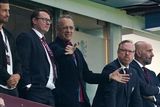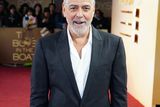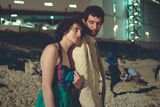Rebel with a camera... James Dean
A new film, Life, charts how photographer Dennis Stock convinced rising star James Dean to shoot an unconventional photo essay in the actor's rural hometown. Here, Joe Hyams tells the story behind their journey together - and shares some of Stock's iconic pictures of the ill-fated Hollywood icon
Dennis Stock met James Dean at a Sunday afternoon soirée in director Nicholas Ray's bungalow in the grounds of the Chateau Marmont, a Los Angeles hotel favoured by showbiz folk in the 1950s. Ray took Dennis by the arm and introduced him to a young man slouched in a chair. "Dennis," Ray said, "I want you to meet James Dean. He's an actor. Jimmy," he said turning to Jimmy, "This is Dennis Stock. He's a photographer, someone you should really get to know." Dennis wondered what Ray saw in the moody, bespectacled young man.
Dennis and Jimmy exchanged a polite few words until they learnt they had someone in common: Gjon Mili, the eminent Life photographer who had directed Jimmy's screen test in New York for Elia Kazan. Dennis had worked as Mili's apprentice and was also his good friend. Jimmy had just finished a film with Kazan and invited Dennis to attend a sneak preview of it later in the week.
Jimmy's casual description of his work led Dennis to believe he had only a small role in East of Eden. Instead, Dennis found himself watching Jimmy's brilliant and profound performance as the lead actor. He knew he was witnessing the birth of a star.
After the screening Dennis passed an alley alongside the theatre and saw Jimmy wearing a leather jacket, hunched on his motorcycle. He was alone. He grinned when he saw Dennis coming toward him and asked what he thought of the film. "You are an outstanding actor!" Dennis blurted out.
They made a date to meet the next day for breakfast. In a nostalgic mood, Jimmy talked about his childhood in Fairmount, Indiana, with such feeling that Dennis told Jimmy that he would like to do a visual biography of his youth. No photographers at that time had ever visited the childhood home of an actor, because few actors had ever been willing to expose their roots, to admit that the seeds of their talent came from quite ordinary soil.
What Dennis was proposing was unique - a photo essay that revealed the origins of the actor. Jimmy said he was planning to go to New York to tidy up some of the loose ends of his life. After that he planned to go to Fairmount for a few days' rest at home with his aunt and uncle Winslow, who had raised him on their farm after the death of his mother. He invited Dennis to go with him.
Dennis occasionally worked for Life, but the editors were not enthusiastic about assigning a layout on an unknown actor. Happily, there were already positive reports in the press about Jimmy's performance in 'Eden. Dennis would be paid $150 a day for two days' work. He knew that the photo essay he visualised would take much more time than Life guaranteed, but he was committed to the idea.
In New York, the two visited Jimmy's old haunts and spent time socialising in Jimmy's apartment. Dennis recalls: "He looked like hell. Jimmy was an insomniac, the worst I'd ever met, and he would simply pass out, for a few minutes or a few hours, then wake up and start out again."
For a few days they wandered around Manhattan while Dennis photographed Jimmy interacting with people on the streets. "I wasn't interested in a lot of the poses Jimmy took," Dennis recalls. "They were artificial, so I let him go through a lot of nonsense until he relaxed and became spontaneous. Then I took photos that I thought were revealing of his true character. Our collaboration was the best imaginable for a portrait exploration."
Dennis photographed him with billboards and movie marquees, a collage of imagery that has universal meaning in the background. The classic picture of Jimmy in the rain walking alone in Times Square, a perfect example of their collaboration, is considered one of the foremost iconic images of the 20th century.
Jimmy and Dennis flew from New York to Indianapolis and then went by bus to Fairmount. Within minutes of their arrival at the Winslow farm, even before Dennis had unpacked his bag in the spare room, Jimmy appeared in his doorway grinning and giggling. He had changed into his old work clothes - green shirt, green army-surplus fatigue pants and worn boots. An old camel-hair cap was tilted over his eyes at a rakish angle.
He was excited to be back where he grew up, anxious to show off the farm he called home and the town he knew like the back of his hand. Fairmount, a classic American small town little changed over the decades, was the spine of his life story. Most of the photos Dennis would take of Jimmy were on the farm or within a one-mile radius of it. Jimmy was a celebrity in his hometown, thanks to his appearances in many television dramas. He was at ease joking with old friends and young fans. No one seemed to be aware of Dennis discreetly taking pictures.
Dennis' photos of Jimmy in Fairmount included pictures of Jimmy playing his bongo drums in the farmyard enclosure surrounded by livestock, lying down in a trough with heifers, and posing with a huge sow. They visited Fairmount's Park Cemetery, where Jimmy stood alongside his great-grandfather Cal Dean's headstone. Ironically, months later, Jimmy would be interred in the cemetery with his mother and generations of his family.
On one of those cold days, while Dennis and Jimmy were walking through Fairmount, they passed by Hunt's Furniture Store on Main Street. "Follow me," Jimmy said and walked into a closed and windowless back room where there were dozens of coffins. Dennis watched in horror as Jimmy took off his boots and climbed into a bronze casket. He crossed his arms and shouted, "Shoot." Dennis refused, saying that it was in bad taste, and suggested Jimmy get out of the casket before someone came in. Jimmy insisted. Dennis took a sequence of pictures: Jimmy lying down with his eyes closed, hands clasped over his chest, smiling and making infantile expressions.
"He was not funny," recalls Dennis. "I had no idea he was going to do that, and I'd never have suggested he do such things. It frightened me, and I know it frightened him, too. In retrospect, I think his way of dealing with fear was to make fun of it, to taunt it." The last picture Dennis took was of Jimmy sitting up in the coffin, hands clasped and staring directly at the camera, a lost expression on his face.
"Everything had gone out of Jimmy by then, all the showmanship, all the cuteness. There was nothing there other than a lost person who really doesn't quite understand why he is doing what he is doing. That's not a moment to underestimate."
Implicit in the series of photos was Jimmy's dark side, coupled with his desire to be close to his mother, who had died when he was nine years old. "We were both saddened by the end of the week in Fairmount," Dennis recalls. "I think we both knew that Jimmy would never come back home again and that life would never be the same for him there. The trip was really a nostalgic farewell to his origins, his way of saying goodbye to the past. I don't mean to imply that he felt he was going to die, but I believe that he felt that he was truly on the way to a far different life." When Dennis' photo essay appeared in Life, in conjunction with the release of 'Eden, it confirmed Jimmy's status as a future film star. It also earned Dennis praise. Nicholas Ray was so impressed with Dennis' work that he wanted to hire him as a stills photographer on Rebel Without a Cause, his film starring Jimmy.
Jimmy's next film was Giant. Dennis went to France to photograph Spencer Tracy on location. He returned to Hollywood just as Jimmy was completing Giant. Jimmy invited him to go with him to Salinas, California, where he planned to race his new Porsche. Dennis first said "Yes," but then something inside of him said "No." Jimmy was killed in the Porsche the next day.
A book of collected images, 'Dennis Stock: James Dean', introduced by Joe Hyams (Thames & Hudson, £24.95), is published on October 6
Join the Irish Independent WhatsApp channel
Stay up to date with all the latest news














